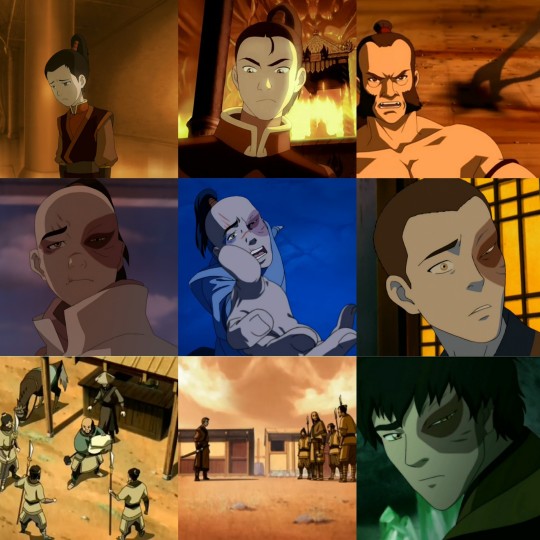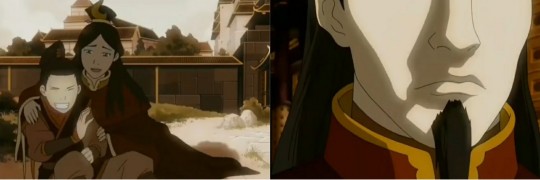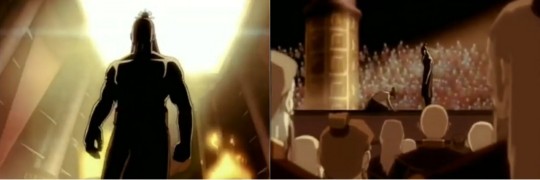#i saw a vid on atla's official yt abt zuko
Text
The Roku/Sozin ancestry plot twist for Zuko
Like I’m sure this has been said before but the twist about Zuko being a descendant of both Roku and Sozin is actually a disservice to his character and his narrative as well? The way the narrative frames this reveal along with Iroh's dialogue, it backtracks on a lot of the story we are shown in Book 1&2 (and sometimes it even clashes with some dialogues in Book 3).
Iroh: “Because understanding the struggle between your two great-grandfathers can help you better understand the battle within yourself. Evil and good are always at war inside you, Zuko. It is your nature, your legacy. But, there is a bright side. What happened generations ago can be resolved now, by you. Because of your legacy, you alone can cleanse the sins of our family and the Fire Nation. Born in you, along with all the strife, is the power to restore balance to the world.”
1. This implies that there are equal amounts of good and evil in Zuko and his internal struggle is about choosing one of them.
The core qualities of Zuko as a character are empathy, compassion and kindness. A person who always gets upset when he sees or even thinks about other people in pain, a person who spoke out against powerful people to save lives that were being sacrificed needlessly, a person who shows mercy to people who don’t deserve it, a person who is willing to reach out a hand to save the life of the man who tried to kill him, a person who avoids fights when possible, a person who is willing to fight on behalf of a family he has known for only one night, a person who reaches out to sympathise after being yelled at— a person like this is definitely not struggling with equal parts of good and evil within them.

Zuko does have two selves, but they can be categorised as pre-scar and post-scar.
His pre-scar version is the version who was unabashedly kind and compassionate, who spoke his mind without thinking of consequences. But his post-scar version was a cover up of the pre-scar version. It was a lie that Zuko lived everyday. He convinced himself that this was how he had to be; because this was what Ozai wanted him to be and that there was no other way.
And yet, when the situation is dire and he is depending on his instincts or when he is given a free choice, we see the pre-scar Zuko spring into action. Because that’s who he really is. It’s not a struggle between good and evil within him, it is his supressed self making an appearance when he slips up and fails to maintain his facade.
Perhaps the line that describes his internal struggle the best is this:
Zuko, imitating Iroh: Zuko, you have to look within yourself to save yourself from your other self. Only then will your true self, reveal itself.
And while this dialogue was played for laughs, it is the most accurate description of how Zuko had to reach for his suppressed self, his real self, to save himself from becoming what Ozai wanted him to be.
2. It also implies that Ozai and Ursa had equal influence on Zuko's upbringing and that he struggled to chose between what was taught to him by Ursa (good) and Ozai (evil).
The idea that Zuko has equal amounts of good and evil inside himself goes hand in hand with idea that the good and evil traits in him have been passed onto him by Ursa and Ozai's upbringings respectively which are legacies of Roku and Sozin.
I don’t need to look any further than “Zuko Alone” to know that Ozai's impact on Zuko's upbringing was slim to none. The flashbacks that we see, are dominated by Ursa's presence. Ozai hardly gets any time onscreen. And when he does, he is shown as a silhouette and when he isn’t a silhouette, we only see him smile at Azula's display of skills and frown at Zuko's attempt.

Ozai was Zuko's father alright, but never in the ways that mattered. We know that Ozai abused Zuko. He constantly belittled him and compared him to Azula. Partially because Zuko lacked the natural talent that Azula had and partially because he lacked the ruthlessness and cruelty that Azula displayed even at her age.
Which made Zuko copy Azula's behaviour to get his father’s acceptance. But whenever Ursa noticed this, she immediately corrected Zuko and clearly told him that it was wrong.
Ozai is never shown to tell Zuko that whatever Ursa told him was wrong. Ozai personally never taught him anything (except that one time). He appreciated Azula's behaviour and encouraged her to keep it up but he just kept on expressing his disappointment in Zuko.
Ursa: Remember this, Zuko. No matter how things may seem to change, never forget who you are.
Zuko's innate kindness and compassion were protected by Ursa in the formative years when he was at his most pliable. And this is why no matter what happens, he never loses these qualities and is able to retain his real self even after he tried hard to suppress it.
3. It diminishes the extent of psychological damage and trauma caused by the scarring incident.
The one time Ozai did take it upon himself to teach something to Zuko:

Ozai: You will learn respect, and suffering will be your teacher.
(Notice that here too Ozai's form is silhouetted against the light behind him.)
The scar is so much more than just a scar to Zuko. It is the one lesson that Ozai taught him. The scar exists because of Zuko's innate compassion. It was put on his face in an attempt to burn out his compassion. It was put there to be a constant reminder of what would happen if he dared to do something that went against what Ozai wanted from him. The scar was Ozai’s brand on his face. It took away Zuko's autonomy to make decisions for himself. It was a constant reminder that Zuko’s opinions didn’t matter.
Post-scar Zuko is Zuko's attempt at supressing his real persona to become the person Ozai wanted him to be, because he learned the hard way that he didn’t have the choice to be anyone else.
In fact, the first time Zuko makes a deliberate choice to go against what was expected of him, (letting Appa go) he succumbed to a fever. His emotional turmoil of coming to terms with the fact that he didn’t need to listen to Ozai and abide by him; a notion that he had been force feeding himself, everyday, for the last three years, manifested itself physically in the form of a fever. That was how deep the psychological damage caused by the scar was. (I hate it when people call it an angst coma.)
Saying that Zuko was struggling with equal amounts of good and evil within him, oversimplifies the complex emotional trajectory he had about coming to terms with the abuse he went through and reclaiming his autonomy and his personal opinions and beliefs, into just a choice between two aspects of his personality.
Zuko: I wanted to speak out against this horrifying plan, but I'm ashamed to say I didn't. My whole life, I struggled to gain my father's love and acceptance, but once I had it, I realized I'd lost myself getting there. I'd forgotten who I was.
4. This implies that Zuko's destiny was pre-determined.
Iroh said in the dialogue that Zuko was born with the power to restore balance in the world and that only he could do it.
Zuko, the character who has always had to struggle to gain what he wanted is suddenly told of an advantage that he had just by the virtue of birth? Kinda defeats the purpose of: "Azula was born lucky; I was lucky to be born", if you ask me.
And even more importantly, he let go of the destiny that Ozai forced on him, only to take on another predetermined destiny; a destiny that was his to fulfil by the virtue of birth, and took steps to fulfil this other destiny, instead of making a destiny of his own and paving his own path to it by making the choices that he had been denied for so long because of Ozai. Which seems weird because all the other times Iroh talks to Zuko about this topic, he always emphasises on how it’s Zuko's choice to make his own destiny:
Lake Laogai:
Zuko: I want my destiny.
Iroh: What that means is up to you.
Lake Laogai:
Zuko: I know my own destiny, Uncle!
Iroh: Is it your own destiny, or is it a destiny someone else has tried to force on you?
Zuko: Stop it, Uncle! I have to do this!
Iroh: I'm begging you, Prince Zuko! It's time for you to look inward and begin asking yourself the big questions. Who are you, and what do you want?
Crossroads of Destiny:
Iroh: Zuko, I am begging you. Look into your heart and see what it is that you truly want.
Western Air Temple:
Iroh: You know Prince Zuko, destiny is a funny thing. You never know how things are going to work out. But if you keep an open mind, and an open heart, I promise you will find your own destiny someday.
5. It indirectly implies that the good™ in Ursa and Zuko exists because they are a part of the Avatar's legacy.
Making Ursa a daughter of a nobleman (as intended originally)* would’ve served a much better purpose for the message that the episode was trying to get across: “the Fire Nation isn’t inherently evil”.
Katara: You mean, after all Roku and Sozin went through together, even after Roku showed him mercy, Sozin betrayed him like that?
Toph: It's like these people are born bad.
Aang: Roku was just as much Fire Nation as Sozin was, right? If anything, their story proves anyone's capable of great good and great evil. Everyone, even the Fire Lord and the Fire Nation have to be treated like they're worth giving a chance.
Had Ursa not been Roku’s descendant, then there would've been people other than just Roku and his descendants, who were Fire Nation and good™. (Iroh is literally the only exception.)
Moreover, Azula is just as much a part of “Roku’s legacy” as Zuko is, and yet is completely overlooked when it comes to it. She isn’t shown to be struggling with equal amounts of good and evil. She isn’t gifted at birth with the capacity to bring balance back to the world. It appears as if she had inherited only “Sozin's legacy”.
So, not only does this Roku/Sozin twist go against Zuko's fundamental characterisation, but it also partially deconstructs the narrative that had been carefully set up for him over the course of 2 seasons.
*(I have been looking relentlessly for the post where I saw two screen caps of the two different characterisations of Ursa: 1. Ursa as we see her in "Zuko Alone"; 2. Ursa as Roku's descendant. And I can't find it now otherwise I would've linked it.)
#i saw a vid on atla's official yt abt zuko#and the way his entire narrative was shown to be hinged on#being roku and sozin's descendant#it pissed me off; so here's the rant#zuko#zuko meta#prince zuko#atla zuko#atla#atla meta#ozai#lady ursa#azula#roku#sozin#avatar#avatar the last airbender#ira's posts
218 notes
·
View notes